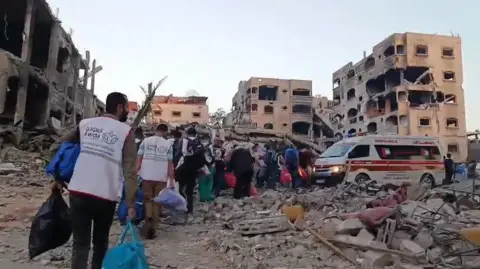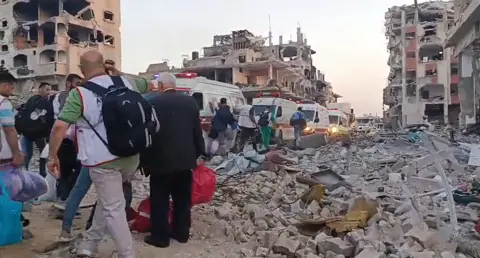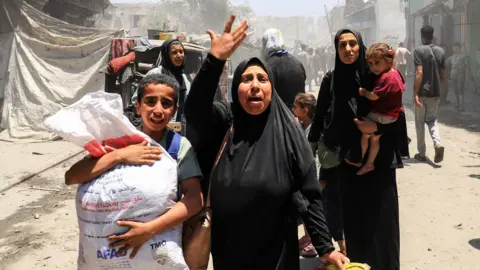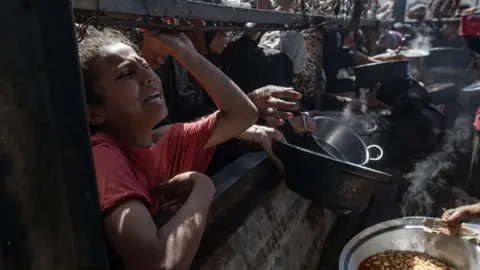Last hospital in North Gaza governorate evacuated after Israeli order
 al-Awda staff
al-Awda staffThe last hospital providing health services in the North Gaza governorate is out of service after the Israeli military ordered its immediate evacuation, the facility's director has said.
Dr Mohammed Salha told the BBC patients were evacuated from al-Awda hospital in Jabalia on Thursday evening after "two weeks of siege", and there was now "no health facility working in the north".
The Israeli Defense Forces (IDF) is yet to respond to enquiries.
It comes as efforts continue to secure a ceasefire. Hamas says it is "thoroughly reviewing" a US plan, which the White House has said has been "signed off" by Israel.
US President Donald Trump said on Friday he believed a deal was "very close". But Hamas has said the plan does not satisfy its core demands including Israel's commitment to ending the war.
The deal would reportedly involve a 60-day pause in fighting, with Hamas releasing 28 hostages - alive and dead - in the first week, with the remaining 30 hostages freed once a permanent ceasefire is in place. More than 1,000 Palestinian prisoners would be released, while humanitarian aid would be sent to Gaza via the United Nations and other agencies.
Israel has continued its military operation in the territory - at least 72 people were killed in strikes over the past 24 hours, Gaza's Hamas-run health ministry said on Friday.
On Thursday evening, the Israeli military ordered the evacuation of the hospital, the facility's director said.
In a voice note to the BBC, Dr Salha said: "We're really sad that we evacuated the hospital, but the Israeli occupation forces threatened us that if we didn't evacuate, they would enter and kill whoever is inside.
"Or they would bomb the hospital. We were thinking of the lives of patients and our staff."
Dr Salha said the hospital faced "a lot of bombing and shooting from the tanks" from around noon local time (09:00 GMT) on Thursday.
He received a call from the Israeli forces at about 13:00 to evacuate, and initially refused because there were patients in need of healthcare. He offered to stay with 10 of his staff and evacuate the others, but the military refused, he said.
After seven hours of negotiations, the evacuation occurred at about 20:30.
Staff carried patients more than 300 metres (984 ft) to ambulances parked away from the hospital because surrounding roads were "totally destroyed".
Two videos sent to the BBC by al-Awda hospital staff show people, some wearing vests with the hospital's name on the back, boarding ambulances and a lorry to the east of the hospital courtyard at sunset, and a convoy of similar vehicles heading south through Jabalia after dark.
Patients were evacuated to al-Shifa hospital in Gaza City. Dr Salha told the BBC they would provide services through a primary health centre in Gaza City and said another might be established in a shelter.
World Health Organization Director-General Tedros Adhanom Ghebreyesus said the closure of al-Awda meant there was no remaining functioning hospital in the North Gaza governorate, "severing a critical lifeline for the people there".
He also reiterated calls for civilians and health workers to be protected saying: "Hospitals must never be attacked or militarised."
 al-Awda staff
al-Awda staffAl-Awda hospital was inside an evacuation zone announced last week, but had still been functioning, its director previously said.
The IDF told the BBC last week it was "operating in the area against terror targets", but that it was "not aware of any siege on the hospital itself".
A statement from 18 charities on Thursday said the hospital had been under military besiegement "for the fourth time since October 2023 and has been struck at least 28 times".
The emergency room was hit, injuring four staff, and the desalination plant and storage unit were also struck, leading to the loss of all medicine, supplies and equipment, the charities said.
UN humanitarian agency OCHA said there were - apart from hospitals - only 61 of 158 primary healthcare centres partially or fully functional in Gaza.
Nine out of 27 UN Palestinian refugee agency health centres were also functioning. OCHA did not report how many, if any, centres were in the North Gaza governorate.
Israel began to allow a limited amount of aid into Gaza last week, after a nearly three-month blockade halted the delivery of supplies including food, medicine, fuel and shelter.
Scenes of chaos have broken out at aid distribution centres run by the Gaza Humanitarian Foundation (GHF) - a US and Israeli-backed group.
The UN and many aid groups have refused to co-operate with the GHF's plans, which they say contradict humanitarian principles.
The head of Doctors Without Borders (MSF), Christopher Lockyear, called the plan "ineffective" and said the most vulnerable have "virtually no chance" of accessing supplies.
GHF said it had distributed six truckloads of food on Friday and plans to build additional sites, including in northern Gaza, in the weeks ahead.
Israel said it imposed the blockade on Gaza to pressurise Hamas to release the remaining hostages, at least 20 of whom are believed to be alive. It has also accused Hamas of stealing aid, which the group denies.
 Reuters
ReutersThe UN condemned the looting on Friday of large amounts of medical aid at a field hospital in central Gaza.
Stephane Dujarric, spokesperson for UN Secretary-General António Guterres, said a group of "armed individuals" stormed "the warehouses at a field hospital in Deir al-Balah, "looting" the aid "intended for malnourished children".
The UN humanitarian agency earlier warned again that the entire population of Gaza was at risk of famine, accusing Israel of blocking all but a trickle of aid from entering the territory.
 EPA
EPAA UN-backed assessment this month said Gaza's 2.1 million people were at a "critical risk" of famine. The UN's humanitarian chief Tom Fletcher told the BBC people in the territory were being subjected to "forced starvation" by Israel.
On Friday, an OCHA spokesman, Jens Laerke, called Gaza "the hungriest place on earth".
Israel is facing international pressure to allow in more aid.
French President Emmanuel Macron said on Friday "we will have to harden our collective position" if Israel does not do more "in the coming hours and days".
Israel's foreign ministry hit back on social media, saying "there is no humanitarian blockade" and accused Macron of continuing a "crusade against the Jewish state".
Some protesters in Israel tried to block aid trucks from entering Gaza, with one saying aid should not be allowed in until Hamas returned the hostages and accepted a US-proposed ceasefire.
Israel launched a military campaign in Gaza in response to Hamas's cross-border attack on 7 October 2023, in which about 1,200 people were killed and 251 others were taken hostage.
At least 54,321 people have been killed in Gaza since then, including 4,058 since Israel resumed its offensive on 18 March, according to the Hamas-run health ministry.
Additional reporting by Naomi Scherbel-Ball and Alice Cuddy in Jerusalem. Verification by Richard Irvine-Brown
